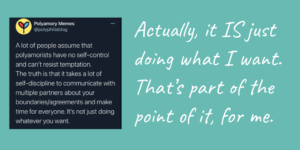In my recent “Communication For Couples” workshop, I taught how I like to use paraphrasing in response to stated opinions and needs from my partner:
Partner: I am feeling yadda yadda when you bazinga because Rumplestilskin.
Me (paraphrasing): You feel blah blah when I whoopdeedoo because supercalifragilisticexpialadocious. Am I understanding?
Partner (digesting and thinking for a minute): Not exactly. More like I’m feeling and so on and so forth when you yippee because McDomlypants.
Me (paraphrasing again): Ok. So you feel rah rah when I she bop bop bop bop because ramalamadingdong.
Partner: Yes.
Me: Is there more you can tell me?
And so on. Repeat until my partner feels like I understand and have nothing more to tell me.
This is paraphrasing in a positive way. The goal is to use my own words to re-express what a person says and feels, to deepen and show my personal understanding.
OR… and this is critical… to find out what I’ve misunderstood.
Because NO ADULT in the history of the human race (and most children of verbal age and up) has never been wrong.
No one.
So, paraphrasing ideas and concepts into your own words is useful when you are using it as a tool to actually bridge the communications gap.
Paraphrasing is also manipulative, self-centered, and often wrong.
It can be used as a way to invalid another person’s emotions and position. It allows us (yes, I say us, because I still guard against this behavior) to wrap another person’s statements in our own biases, hurts and assumptions, and set up our own personal windmills for tilting.
The problem is, it hurts them and us. And it hurts trust and communication.
Let’s look at an example:
Partner: I am feeling yadda yadda when you bazinga because Rumplestilskin.
Me (paraphrasing): You mean you want to break up with me?
Partner: No. More I’m feeling and so on and so forth when you yippee because McDomlypants.
Me (paraphrasing): I can’t believe you’re saying this. I thought we’d be together forever.
Partner: I’m not breaking up with you. I’m just trying to express some feelings.
Me: You don’t even know what you’re saying. What you’re really saying is that you want to break up. I can tell. I can hear it in your voice. See it in your face.
Partner: I don’t want to break up with you. I’m just having a hard time…
Me: Why would you want to be with someone who treats you so horribly?
In this case, paraphrasing is used as fact. Not as a tool to communicate, but as a club to beat the other person over the head emotionally for daring to express any negativity.
It invalidates their feelings, and forces other feelings onto them that they had no interest in.
Have you ever…?
Been a victim of paraphrasing by someone who refused to acknowledge your actual thoughts and feelings?
Been the perpetrator, so caught up in your head and your fears and your biases that you unwittingly invalidated a friend’s or loved one’s feelings and thoughts?
I admit: I’ve been both, sadly.







